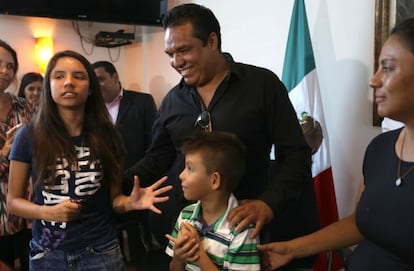Mexican teenager’s mistaken identity ordeal has happy ending
Alondra Luna Nuñez was taken against her will to the United States She had been wrongly identified by a woman who was searching for her daughter


A group of federal agents burst into a small school in Guanajuato, Mexico last Thursday. But they weren’t in search of criminals, rather one of the students: 14-year-old Alondra Luna Nuñez.
The team had orders from Interpol to take Alondra to a judge, but she was unwilling to cooperate and they had to literally carry her out kicking and screaming. The next day she went before a magistrate, and the day after was put on a plane headed for Houston, Texas.
In the US, Dorotea García was waiting for her, a woman who claimed to be Alondra’s biological mother, who had begun legal proceedings to get back the person she believed to be her daughter.
Alondra was unwilling to cooperate with the federal agents and they had to carry her out kicking and screaming
The only problem was that Dorotea was not her mother, and definitive DNA testing to prove it was not done properly until almost a week after the child had been taken away from her true family.
Gustavo Luna Romero and Susana Núñez Granados, Alondra’s parents, spent a week racked by a mixture of disbelief and horror after their daughter was taken from them. Their nightmare came to an end in the early hours of Wednesday morning, when a call from the US confirmed that their daughter would be coming home.
“I thought that I was going to have to stay and live there,” explained Alondra herself during an improvised press conference held shortly after she landed at Guanajuato airport on Wednesday morning. “The judge didn’t want me to do the DNA test. I did, but she wouldn’t let me. So I asked Mrs Dorotea to do it for me because I wasn’t going to be at peace. And it came out negative.”
The chain of errors was caused by mistakes made by politicians, court officers and police, both in Mexico and the United States. “All of the authorities were involved in this,” explained the father of the child in statements made to Mexican media.
The chain of errors was caused by mistakes made by politicians, court officers and police, both in Mexico and the US
The events began when Dorotea García, a Mexican residing in the US, returned to her country of origin in search of her daughter, who was abducted eight years ago by her ex-husband.
Following a clue that led her to Guanajuato, she found Alondra, who she believed was her daughter: they shared a name, they had the same age, and they both had a small scar between their eyebrows.
García took the case to the courts in Houston, which prompted the US Justice Department to file a formal request with the Mexican foreign secretary, who then sent the case along to a court in Michoacán, García’s home state.
A judge then dispatched the federal police to collect the girl, who, according to witnesses cited by Mexican media, was not permitted by the courts to undergo a DNA test. Alondra was sent to Houston the very next day.
The parents of the child say they feel no ill will toward García, but they have announced they will be taking legal action in order to seek compensation for the chain of errors in the case. Miguel Márquez Márquez, the governor of Guanajuato, has announced that he will support the family in its quest to bring the authorities involved to account for the incident. According to her parents, Alondra is being given support by a team of psychologists, after which time she will return to school, no doubt highly relieved that her nightmare is over.
Tu suscripción se está usando en otro dispositivo
¿Quieres añadir otro usuario a tu suscripción?
Si continúas leyendo en este dispositivo, no se podrá leer en el otro.
FlechaTu suscripción se está usando en otro dispositivo y solo puedes acceder a EL PAÍS desde un dispositivo a la vez.
Si quieres compartir tu cuenta, cambia tu suscripción a la modalidad Premium, así podrás añadir otro usuario. Cada uno accederá con su propia cuenta de email, lo que os permitirá personalizar vuestra experiencia en EL PAÍS.
¿Tienes una suscripción de empresa? Accede aquí para contratar más cuentas.
En el caso de no saber quién está usando tu cuenta, te recomendamos cambiar tu contraseña aquí.
Si decides continuar compartiendo tu cuenta, este mensaje se mostrará en tu dispositivo y en el de la otra persona que está usando tu cuenta de forma indefinida, afectando a tu experiencia de lectura. Puedes consultar aquí los términos y condiciones de la suscripción digital.








































